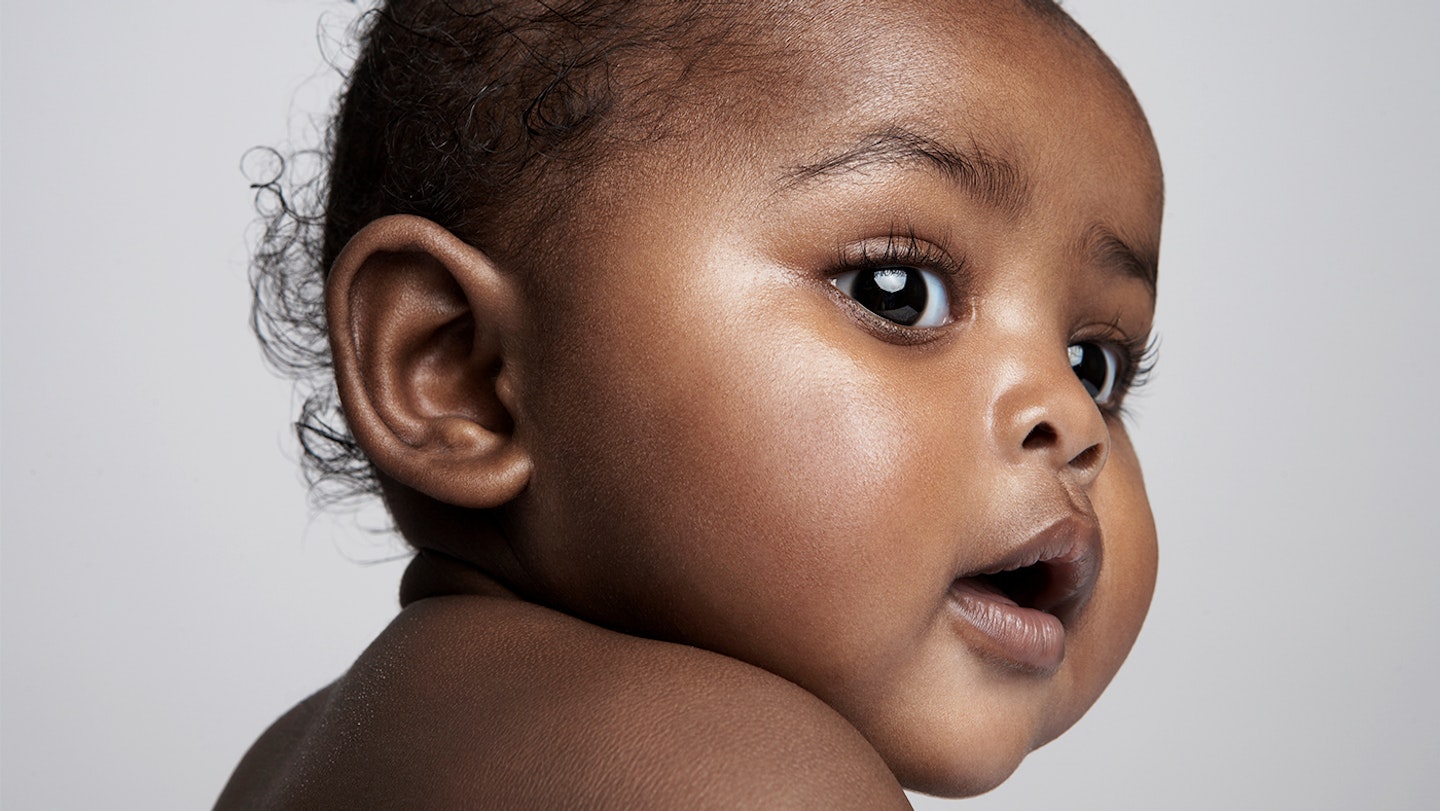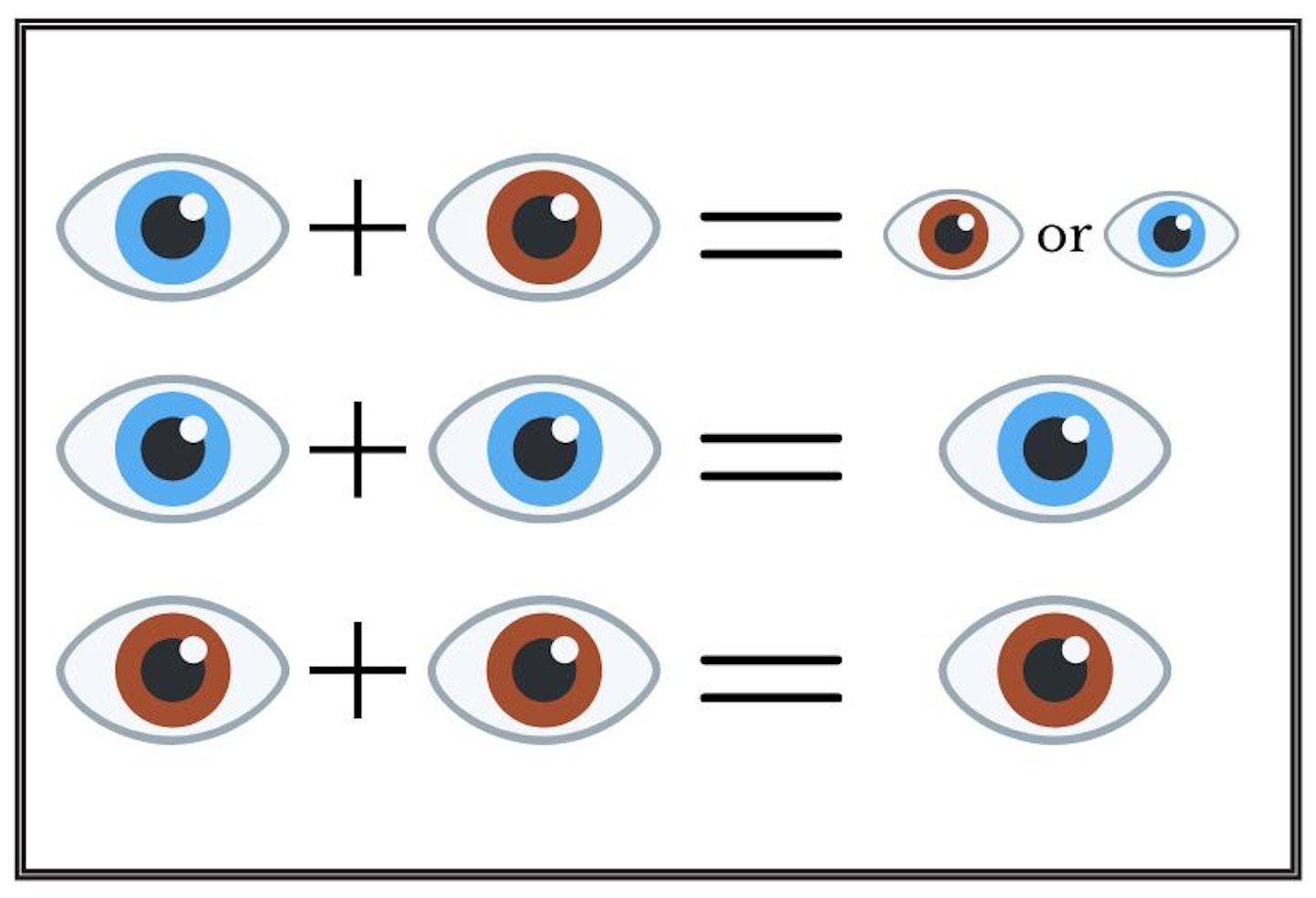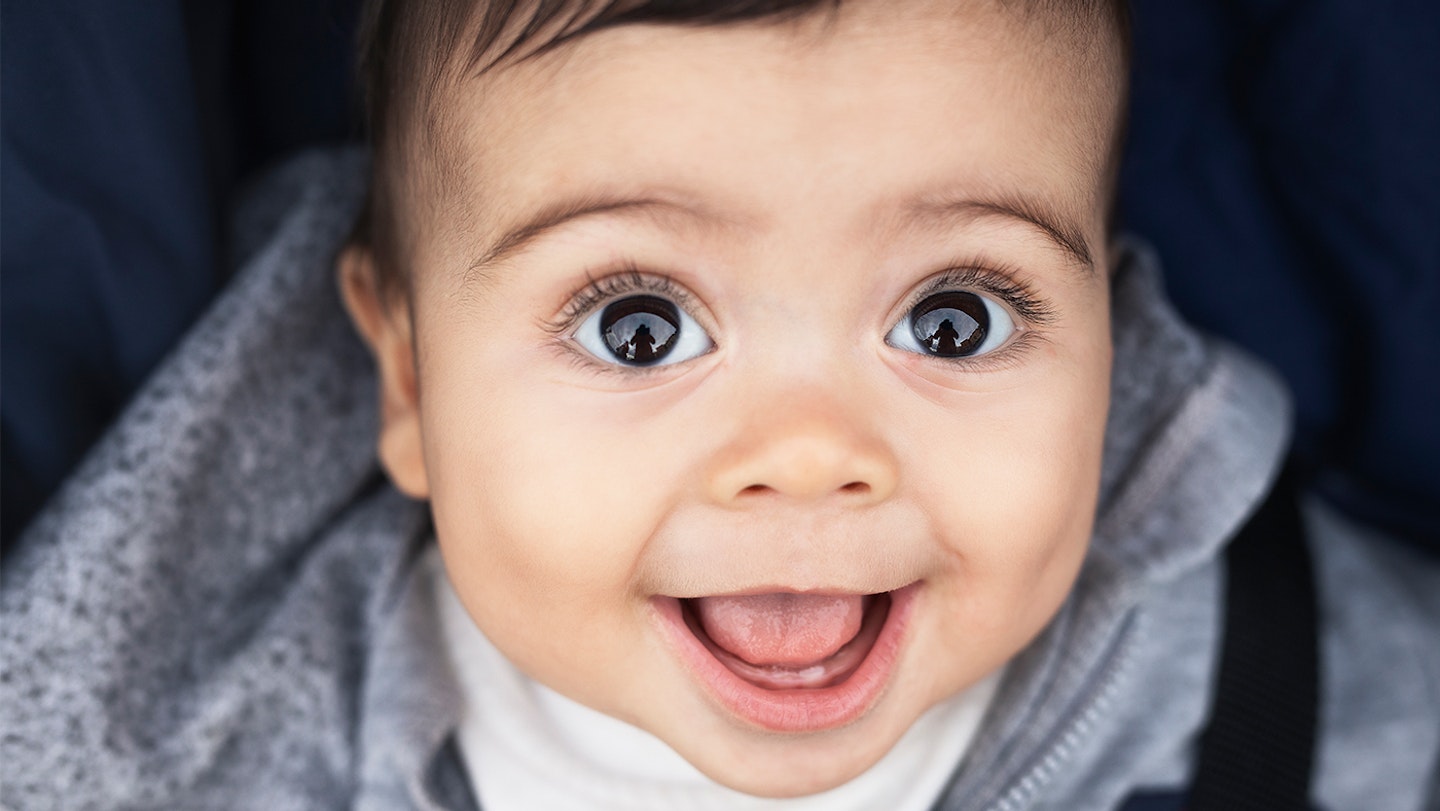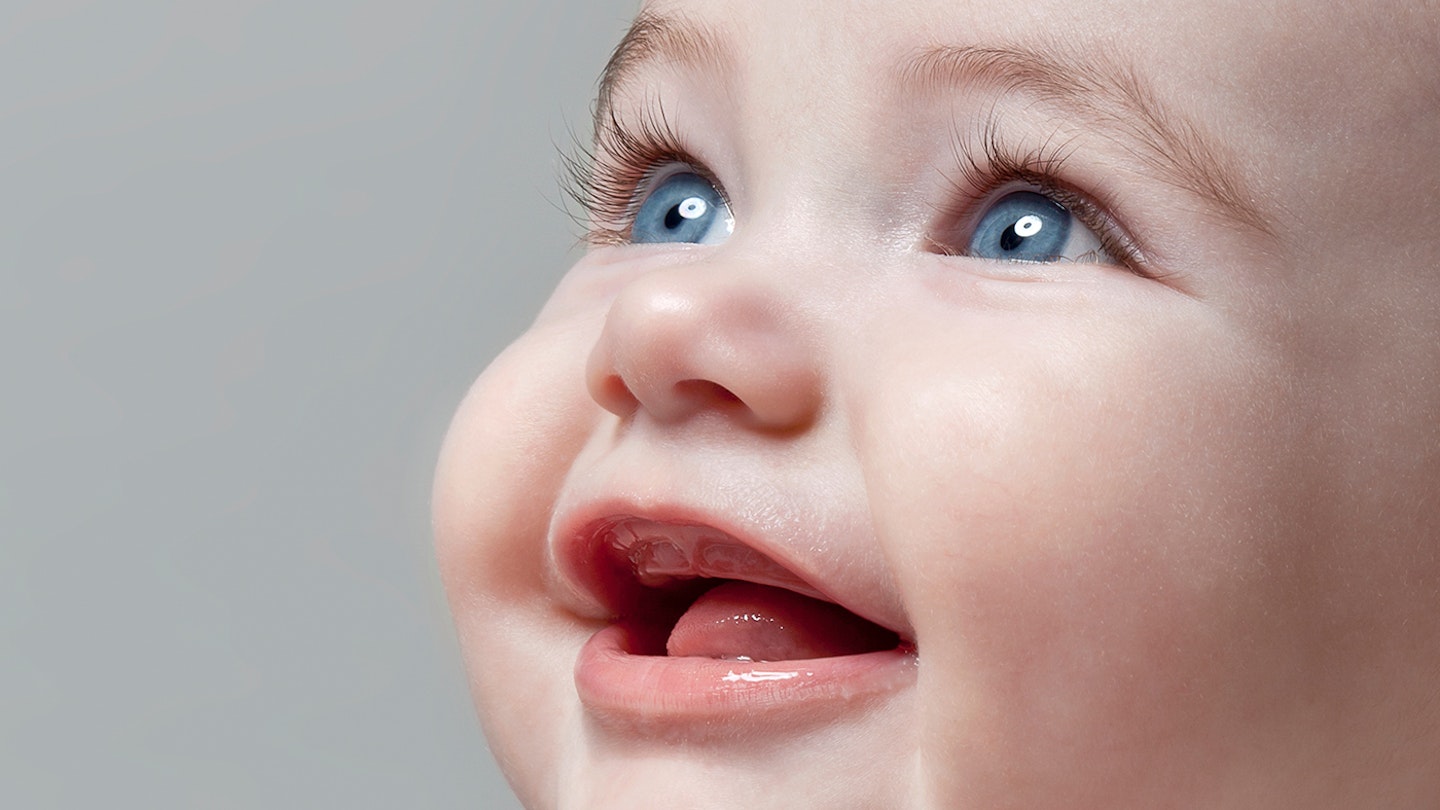After waiting so long to meet your baby, you're probably gazing into those big beautiful eyes with wonder. But did you know the colour of their eyes could change? Those baby blues might stay as they are but they could change to brown, depending on various factors.
So if you're wondering when do babies eyes change colour, and why, read on. We've spoken to Rachel FitzD, retired midwife, baby expert, parenting consultant and author to discover the science behind baby's eye colour change and what you can expect from your newborn's eye colour.
What is eye colour?
Eye colour refers to the appearance of our iris, the muscular ring that surrounds our pupils. It's the iris that helps control the amount of light that enters our eyes. This iris comes in a variety of colours from green to blue, hazel to dark brown.
Like us adults, babies' pupils will always be black, just like how the sclera (better known as the whites) will always be white. This can change however if your child is showing symptoms of jaundice, where they may have yellow-tinged eyes. Equally, if their eyes start to look red, it may be one of the signs of conjunctivitis.

When do babies' eyes change colour?
Your newborn's eye colour is unlikely to stay the same. Even if they're born with blue eyes and they stay blue, they'll change subtly as they age. As our expert, Rachel FitzD notes, "everyone with blue eyes knows that there are shades of blues and often children's blue eyes are 'bluer' when they're born and then go greyer or get a hint of green as they get older." As a rule, eye colours gets darker rather than lighter, so babies born with blue eyes may get darker or turn brown, but babies born with brown eyes will never end up with blue eyes.
As the NHS notes, most dramatic eye colour changes occur when your child is between the ages of three and six months old. By that point, the iris has enough pigment for you to be able to better predict what the final eye colour will be. But while you'll be able to tell whether they'll have blue, green or brown eyes by their first birthday, baby's eyes may not stop changing colour until they're three years old.
Are all babies born with blue eyes?
While this is a common belief, not all newborns have blue eyes. While many Caucasian newborns' eyes appear blue or grey, this is just because they tend to be born with less pigment than other ethnicities. As they are exposed to the light, the eye colour can start to change. Typically, African, Hispanic, and Asian babies are born with brown eyes.
Why do babies' eyes change colour?
The final colour of your baby's eyes is determined by two things: Genetics and Melanin.
Genetics
If you're wondering what colour your baby's eyes will be, you can look in the mirror and at your partner and wider family. That's because the eventual colour of your baby's eyes is largely determined by genetics. There is one specific chromosome that is most responsible for determining your baby's eye colour. This chromosome carries two genes:
• One will determine the amount of melanin in your youngster's iris
• The other controls the activity of the melanocytes, the cell which contains the melanin
Together, these genes work together to determine baby's eye colour.
As a result, while you can't necessarily work out your baby's eye colour just by looking at you and your partner's eye colour, you can get a pretty good idea.
As this eye colour activity from Imperial University shows:
• If both parents have blue eyes, it's likely (though not always the case) that you'll have a blue-eyed child
• If both parents have brown eyes, you're more likely to have a brown-eyed child
• If one parent has brown eyes and the other has blue eyes, the chances are fairly even that your baby could end up with blue or brown eyes
• If one of the grandparents has blue eyes, the baby has a slightly higher chance of having blue eyes

However, as with most science, it's not really this simple. Your baby's eye colour is made up of around 16 genes, all of which can affect the eventual colour of their eyes. So while you can take a guess at your baby's eye colour based on the colour of yours and your partner's, it's not a foolproof baby eye colour predictor.
And of course, as Rachel notes, "even within the one colour there will be a spectrum of colours. This is all to do with the activation of melanin in the eyes that creates those variations." So the eventual colour of your baby's eyes is unlikely to be exactly the same as its parents.
Melanin
The colour of your baby's irises is to do with something called melanin, a protein secreted by cells called melanocytes which also determines the colour of your skin.
So the colour of your eyes is determined by the amount of melanin in your eyes, which means they are able to absorb more or less light. Simply put, the more melanin you have in your eyes, the darker your eyes will be.

Those with more melanin won't be able to absorb as much light, making their eyes appear dark brown, whereas those with blue eyes will have a tiny amount of melanin, meaning that all the light that enters them is scattered back into the atmosphere, creating a blue hue. Green or hazel eyes are somewhere in the middle.
As Rachel FitzD explains, babies eyes change colour in the early months because newborns aren't born with the levels of melanin they'll eventually have. "The amount of melanin increases over time as the baby is exposed to daylight, and even through childhood and adulthood, eyes change colour subtly." This is why a baby's eye colour may change from blue to another colour in a few months.
"Your baby's eyes don't reach their full colour for a while because they haven't had enough daylight so the melanocytes (colour-making cells) haven't been triggered" says Rachel. These melanocytes in the iris secrete melanin in response to daylight so as the baby is exposed to more and more daylight, their eyes will change colour.
How can you tell if your baby's eyes will stay blue?
Supposedly, there is a way to tell whether or not eye colour will change by looking at a baby's eye from the side so that there's no light affecting your view. If there are hints of gold in the iris, it means their eyes will probably become brown or green over time. Whereas if the eyes are still very blue, they are likely to stay that way.
But in terms of answering the question, 'when do babies eyes change colour?'; every baby is different and only time will tell! The only real way of knowing the final colour of your baby's eyes is to wait patiently until they're around a year old.
So keep staring into those big eyes of your little baby - and don't note down the colour in their baby book just yet!
When do babies' eyes change colour? FAQs
When can you tell what colour eyes a baby will have?
While a baby's eyes will continue changing subtly for a few years, you should be able to tell what colour eyes they'll have when they're around 3-6 months.
Do all newborns have blue eyes?
No, not all babies are born with blue eyes. Many babies are born with brown eyes, and this is all down to genetics and melanin.
Can two brown-eyed parents make a blue-eyed baby?
Yes, two brown-eyed parents can make a blue-eyed baby. This is because your eye colour is made up of around 16 genes (alleles) which are passed down from grandparents as well. If both parents carry the blue-eye allele, there's a chance their baby will have blue eyes, even if they both have brown eyes.
About the expert
Rachel FitzD is a baby and parenting expert and a retired specialist midwife. She is a regular writer and presenter for The Baby Show and the author of two books, 'Your Baby Skin To Skin’ & ‘Stretched To The Limits’.
About the author
Emily Gilbert is the Features & Reviews Editor for Mother&Baby and has written for the website and previously the magazine since 2015. First-time mum to Theodore, Emily writes about everything from the top baby products to pregnancy, fertility and maternal mental health. Specialising in product reviews, Emily is the first to know about all the exciting new releases in the parenting industry.
